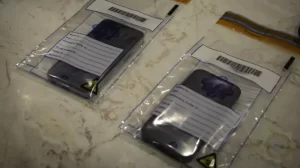Major International Crackdown on Encrypted Crime Network Leads to Over 50 Arrests
3 min read
A huge amount of cash was seized

A huge amount of cash was seized
In a significant international operation, law enforcement agencies have arrested more than 50 individuals as part of a crackdown on an encrypted communication platform known as Ghost. This platform was allegedly used to coordinate various criminal activities, including large-scale drug trafficking, money laundering, and extreme acts of violence.
The joint operation involved Europol, Eurojust, and multiple international law enforcement agencies. During the investigation, 51 suspects were apprehended across several countries: 38 in Australia, 11 in Ireland, and one each in Canada and Italy, with the Italian suspect linked to the Sacra Corona Unita mafia group. Europol has reported that numerous life-threatening situations were averted and a drug lab was dismantled in Australia.
In Ireland, the operation saw the Gardaí (Irish police) confiscate €15.2 million (£12.8 million) worth of cocaine and 42 suspected encrypted devices. The Gardaí had been investigating four organized crime groups and their support networks primarily based in Dublin and the surrounding regions. On a single day of action, over 300 Gardaí conducted searches across 27 locations.
The searches yielded a wealth of evidence and contraband, including:

Additionally, an articulated truck was intercepted in southeastern Ireland, leading to the recovery of 100 kilograms of cocaine concealed within it. This cocaine, which is currently undergoing analysis by Forensic Science Ireland, is estimated to be worth €7 million (£5.8 million). Five men, aged between 30 and 50, were arrested in connection with this particular seizure.
According to a statement from An Garda Síochána, the Ghost platform gained notoriety among criminal groups due to its robust security features. Users could acquire access without revealing any personal information, utilizing three layers of encryption. The platform allowed messages to be sent with a self-destruct code, erasing all communications from the recipient’s device. This feature enabled criminal networks to maintain secure communication, evade law enforcement detection, and orchestrate illegal activities across national borders.
The Ghost platform boasted a global user base of thousands, equipped with its own infrastructure and applications supported by a network of resellers in multiple countries. It was estimated that around 1,000 messages were exchanged daily through Ghost.
The platform’s servers were located in France and Iceland, while the company owners were based in Australia, and financial operations were linked to the United States. The international scale of the operation reflects the complexity and reach of the criminal networks involved.
Further arrests are expected as the global investigation progresses. Europol’s executive director, Catherine De Bolle, emphasized the collective strength of international law enforcement efforts, stating that “no matter how hidden criminal networks think they are, they can’t evade our collective effort.” She highlighted the dismantling of Ghost as a significant blow to serious organized crime.
At a press conference held at Europol Headquarters in The Hague, An Garda Síochána Assistant Commissioner Justin Kelly reiterated Ireland’s commitment to combating transnational organized crime. He noted that these criminal networks disregard borders and laws, emphasizing the necessity of collaborative efforts to dismantle their operations.
“It takes a network to defeat a network,” Kelly stated, underscoring the importance of coordinated law enforcement initiatives in addressing the challenges posed by organized crime globally. The successful outcome of this operation signals a powerful message to criminal organizations operating across borders: their days of evasion are numbered.